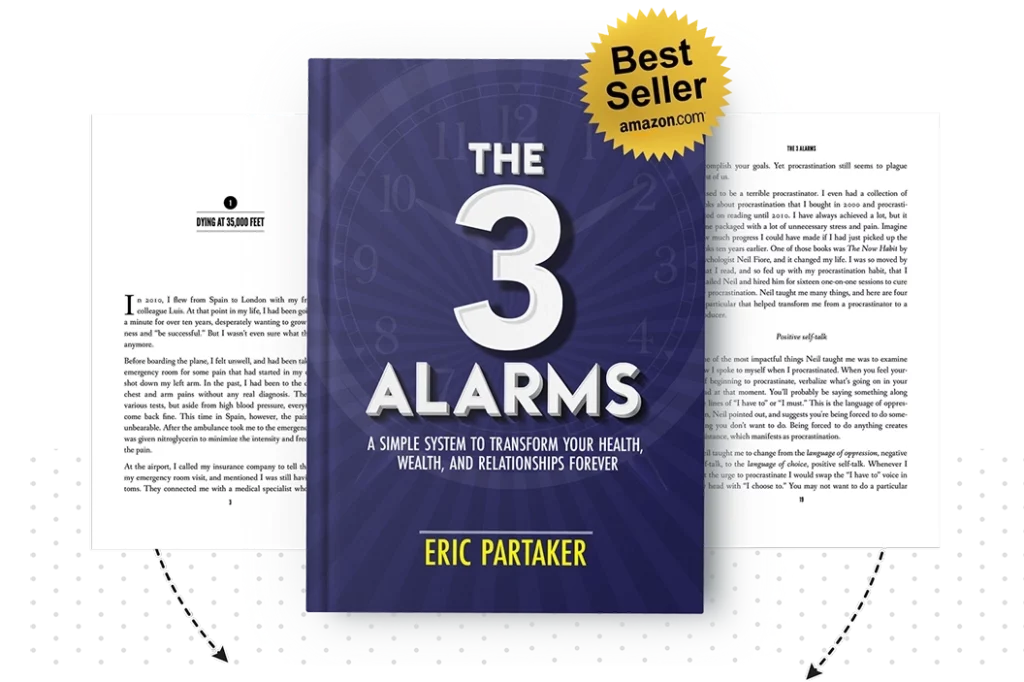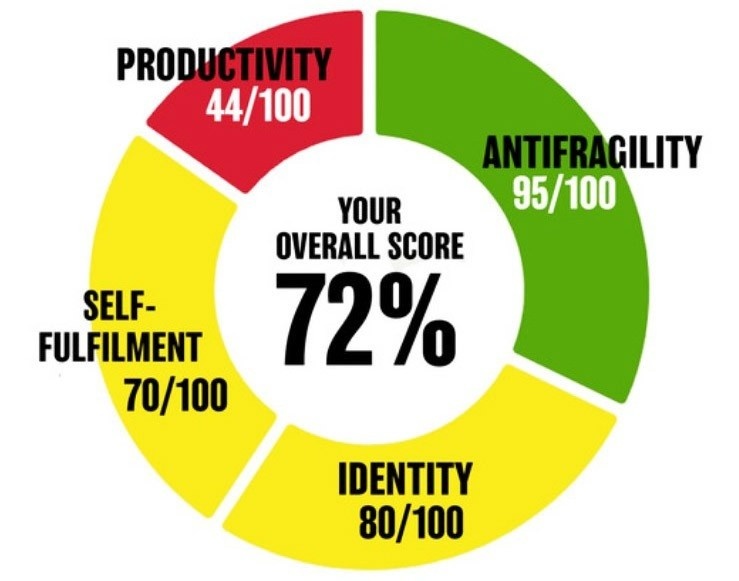SUMMARY
- We all want to improve, professionally and personally. But until you master the art of measuring, and thinking creatively about how you can be measuring all of these different things, you won’t truly improve in any of these areas. This episode will show you the ways you can measure what truly matters.
- First, start thinking about “masterpiece” days. Think about the last great day you had, and determine the conditions that made that day great. Try to measure and replicate these conditions, creating a routine and then stringing together as many days as you can.
- Measure nutrition by having an accountability partner, and keeping track of what each other eats. Measure sleeping time by installing sleep tracker apps in your devices. In terms of exercise, measure not only pounds lost but also the days when you showed up to work out. These will help you fully achieve your health-related goals.
- You can lessen bad habits by measuring them via a “fail log”, ticking or marking on paper every time you catch yourself doing a bad habit. Regarding goal-setting, you can create a chart where you can color-code the status of your goals, visual cues to help you course correct and get things going again. Related to this, you can increase the amount of “deep work” you do by determining what work truly matters, and measuring how much of it you are actually doing.
- You can also track your wins and learns on a daily basis. Wins are things that have gone well, your feel-good moments, while learns are instances where you could’ve done better, a learning moment.
- Finally, you can also track your acts of kindness, raising your personal awareness to actively seek out opportunities to help others.
TRANSCRIPT
If you’re like most people, you probably have a myriad of things that you want to be improving in life and probably not just on the work front, but also on the health and the home front. But the truth is until you master the art of measuring and think creatively about how you can be measuring all of these different things you won’t improve in any of these areas. Hi, my name is Eric Partaker and I help CEOs, entrepreneurs, leaders, and individuals close that gap between where they are and where they’d like to be, helping them improve in all areas of their business and life. Today, I want to take you through nine ways in which you can measure what truly matters and then create improvement in critical areas of your work and life.
Number one, we have to think about what are called master peace days. So John Wooden, the famous late basketball coach said that our secret to life is about stringing together as many masterpiece days as possible, that we need to make each day truly a masterpiece. What he meant by that is that a day is a perfect unit of time. Think about it a day is, if we string together as many winning days as possible, that over time is going to lead to great results. But here’s the thing we don’t take enough time to reflect upon well, what are the conditions that enable a great day versus what are the things that happen or that I don’t do that typically lead to a bad day? So I’d like ask you to think about when was the last great day that you had and think about what, what was the way in which, how was that day started? What were the conditions that enabled that day? What were the things that you did? Was it a routine you followed? a certain protocol, certain things that were set up or optimized? Then similarly what happened during that day, and then also, how did that day end? Because the seeds for your improvement when it comes to stringing together as many winning days as possible lie within your own life experiences.
Then once you’ve concluded, what are the things that lead to a strong masterpiece winning day that should become a routine that you can measure. I, for example, have a five point checklist things that I look for that if I do every single day in terms of how I start my day, things that I do during the day and things that I do to end my day. I know that if I do those five things that on average, it’s going to lead to a great day. So that’s the first thing that you can be measuring is your masterpiece days.
Number two, you could be measuring your nutrition. We all know that we are what we eat and too often, people don’t think of creative ways in which they could be measuring their nutrition. There’s two things that I suggest that you do here. One is pick an accountability partner, it could be your spouse or a partner or a friend. Then all you’re going to do is start measuring what you eat, but you’re going to do it very, very simply through the use of your phone. All I want you to do is snap a photo of every single thing that you eat and drink and send that via WhatsApp or whatever other messaging that you have on your phone to your friend. The beauty of this is that you’re able to quickly capture whatever it is that you’re eating or drinking in the moment, it’s time stamped so you know exactly when it’s being consumed and you can visually see, does it look healthy? Do the portions look right? All of that is handled within just a matter of seconds.
Then here’s the funny thing to think about this. Do you think you’re going to feel great if you continually have to send photographs of ice cream or cheeseburgers or slices of pizza or glasses of wine or beers, eventually that negative feedback that you’re getting kind of mounts up and prompts you to make better decisions so you’re not sending and measuring horrible food through your photography.
Number three, you can be measuring your sleep. Now you can go all out on this and you could buy a fancy aura ring, which will cost you a couple of hundred dollars. There’s other devices out there as well through your phone that tracks sleep. The simplest thing that I do is I just track, am I getting eight hours of sleep or not? I have that actually as one of my masterpiece day routine items that I track. It’s actually the first thing on that list is, did I get eight hours of sleep or not? I have it in a Google sheet and I just simply tick the box if I’ve done eight hours of sleep or not. So that’s another simple thing that you can be tracking on a daily basis. You’ll be surprised how few times you actually get a full eight hours of sleep once you start tracking your sleep time and your wake up time.
Number four, you can be bringing some measurement to your exercise and I don’t just mean in terms of the amount of weight that you lose maybe that’s the goal that you have, but once you have that goal in mind, you should be focusing on the process. What do I mean then? Well, the way you’re going to achieve that goal is by showing up at the gym or showing up for your exercise. So once again, similar to nutrition or to sleep, you can be tracking that on a daily basis, a simple tick mark on a Google sheet, maybe you have a visual scoreboard up in your home, but simply mark the days that you’re getting your exercise so that you can see over time. Am I actually exercising enough? As I know that I should be, as the best version of me would be exercising.
Number five, you can actually be measuring your bad habits and this is called a foul log. So one of the bad habits that I had in the past was that I was constantly jumping around switching from task to task. We know from the book, The One Thing that when you’re constantly finding yourself switching and jumping around from task to task, whether it’s checking an email or checking out a notification in Slack or a social media that comes up, when that all is happening constantly, you actually lose 28% of your day. This is crazy because if you extrapolate that in a year, it’s 13 weeks lost in a year, meaning you’re only playing with three quarters in a year instead of four and over a professional career of 40 years, you’re losing an entire decade. What could you do with an extra decade? So when it comes to a foul log or tracking a bad habit, you’re simply noticing every single time that you engage in that habit. That once again, visually over time, create some negative feedback and it purposefully makes you think twice about recording those tick marks as time goes on.
So for me, in this example, I simply had a sheet and I ticked a little, just a simple tick mark with the pen every time that I jumped from one task to the next. When I looked at the first few days of me doing this, it was crazy. I had so many tick marks of constantly switching from email to phone, to Slack, to back to whatever it was that I was working on or reading to a phone call but over time on a daily basis, the tick marks decreased. Why? Because of the negative feedback building up, because I had committed to noting every single time that I switched tasks with a tick mark and so every time I had to pick up that pen to note a task that was about to happen, I suddenly started to think, wait a second, do I want to record that tick mark? Then I would stay on track with whatever I was doing at the moment and over time, that negative feedback led to less bad habits.
So what are some bad habits that you could benefit from recording some negative feedback on and building a foul log around?
Number six is all about goals. It’s one thing to set goals, it’s another thing to constantly measure how are you progressing against those goals? A thing that I like to do here on a weekly basis is traffic light my goals. So I’ll have, for example, in this quarter I have about eight different goals that I’m working on. On a weekly basis I look at those goals and I just simply ask myself, am I green, yellow, or red in my likelihood of actually achieving the goal on time? Of course, if I’ve already achieved the goal it’s green every single week when I asked that question, but many other goals may still be yet to be achieved. Now, if I think I’m on track and I’m going to achieve that goal well, then I’ll put it as a green. If I think it’s slightly at risk, it’s a yellow and I need to think about what I need to do to get it back on track. If it’s seriously off track and I need to take urgent action, that’s obviously a red. Then that prompts me to think about what do I need to be doing this week to course correct and get things going to where they need to be. All because once again I’m measuring something that matters.
Number seven, you could be measuring the amount of deep work that you do. Now, what is deep work, deep work defined by Cal Newport from the book of the same title, which he wrote, is about engaging and deep work is engaging in something that’s cognitively demanding with intense distraction free focus. Now, the way I like to think about deep work is I like to relate it to well, what are the things that truly move the needle in my line of work? What are the things which if I engaged more in, which would really stretch my ability level, that could also lead to the development of the business, myself, to development of our profitability and I like to record how many minutes I’m working on that over time per day. Here’s the shocking thing when you start doing this, when you define what is truly deep work, truly needle moving stuff versus just trivial tactical work and start recording how many minutes are you actually spending on that? You’ll be shocked to see that you’re actually not spending enough time. Maybe you’re only spending 30, 60, 90 minutes on what truly matters, when you should be trying to get that up to say three to four hours per day. How do you do that?
Well, first by shining the spotlight of awareness on it, by measuring it, to see where you are. But then secondly, thinking about how do you design your week and who could you be delegating work to or bringing in to help you to be offloading some of the things that you shouldn’t be doing so you can focus more of the time on the stuff that you should be doing.
Number eight, I like to track on a daily basis, wins and learns. So wins are things that have gone well. I like to note them, it makes me feel good. We should all be trying to make ourselves feel good. Then learns are things that I could have done better, things that need a bit of work and I like to capture those too, because it helps me constantly improve continuous evolvement.
Number nine, I encourage you to try tracking acts of kindness. You’ll be amazed what happens to your generosity, to your empathy, to your compassion, to your willingness to seek out and help others when on a daily basis, you’re trying to track your acts of kindness. When you’re trying to say hit at least three, four or five in a day.
Now you don’t have to be doing all nine of these things but my point with today’s message is simply to get you to realize that if you are trying to close that gap between where you are and where you’d like to be, not just in the work front, but also in the health and the home front, or the relationship front, if you really want to reach that next level then what gets measured gets done. Don’t think about measurement just in the work context, you can be bringing measurement creatively to all aspects of your life and really hitting that next level.




